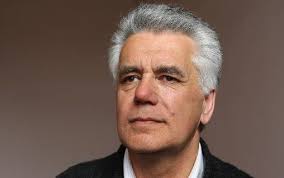Charmaine celebrated her 77th birthday on Thursday 11 July, and Tanya had organised a lovely day- a cuppa in bed and a beautiful gift, breakfast at a cafe in Grey Lynn, and a surprise outing in the evening- all Charmaine knew in advance was to be ready for an Uber at 5.40pm.
We went outside at the appointed time, and there was a small green ‘uber’ waiting for us- driven by friend Deb, with partner Rosemary beside her, singing “Happy Birthday”- a singing Uber!! Off to the city for a meal at Le Garde Manger in Upper Queen Street, and then to a play at the Basement Theatre- Grace Iwashita-Taylor’s My Own Darling (described by Grace as her ” love-hate letter to Auckland”) , with Grace as narrator-poet, and her co-stars Gabby Solomona and Fasitua Amosa, all three playing a range of different roles which reflected critically on our city and its destructive effects on many of the people who live here..
… a political actvity: MATIKE MAI
On Monday 15 July Dr Moana Jackson, distinguished lawyer, writer, philosopher and activist, spoke at a gathering called Matike Mai, organised by ASTR (Asians Supporting Tino Rangatiratanga) to discuss the question:
How can all tauiwi/settlers to these lands support the vision
for constitutional transformation by 2040?
More than 200 hui organised by Maori have already been held around Aotearoa, including over 70 with young people, and so far these are some of the values that have been agreed as a basis for constitutional development:
- Te Whenua must be the foundation
- Everyone who comes to live here and accepts Te Tiriti has a place of equal worth
- There needs to be protection for the most vulnerable
- A constitution is evolving (like whakapapa, it is an endless series of beginnings).
To develop a creative and useful constitution for Aotearoa, we need to have processes which develop relationships of trust and respect among the individuals and groups that constitute our society- and strategies for continuing these processes as the population and our social arrangements change.
And clearly we must have a shared understanding, as a nation, of the Treaty upon which this nation is founded. We still have a long way to go before this is achieved, but we have seen some progress in the last forty years.
Moana quoted a revered 84-year-old kuia at one of the hui: “I’ve been waiting for this all my life..” she said.
“It may not happen now,” Moana said, “but it will happen.”
We need to find our own ways as Pakeha to support the development of a constitution for Aotearoa- the work already done is enormous and exciting, and we will continue to engage in this process as supporters of Te Tiriti o Waitangi
Well done ASTR for organising this event, and encouraging the wide range of people who attended to engage, discuss differences, and move forward in forming constructive relationships.
On the site link below you will find an excellent document available for individuals and groups who would like to contribute to ongoing discussion:
..and a very political writer: ARUNDHATI ROY..
Almost a thousand people gathered in Auckland’s Victory Convention Centre to hear Arundhati Roy speak about her life and work with NZ writer Paula Morris. You may have read one or both of her novels: The God of Small Things, and The Ministry of Utmost Happiness, and if so will want to read her recently published book of essays, My Seditious Heart. Although her writing is firmly grounded in her home country, India, her work resonates with readers all around the world. My Seditious Heart is an intensely political book touching on issues which occur in many counties besides India – including our own.
Arundhati did not set out to be a disrupter or a political activist- those roles have, however, been thrust upon her. She performs them with flair and power, now at an international level, which is some protection for her against the persecution she might otherwise suffer at home.
She talked about the troubles springing from the definition of India’s boundaries by English colonisers – it is not, and cannot be, one nation with one state religion , she believes, because it is actually an arbitrarily selected part of the Asian sub- continent, with more than four hundred languages and many religions and ethnicities. Any attempt to impose a single identity can only be catastrophic- the issues in Kashmir are a microcosm, she believes, of what will come. She is essentially pessimistic about the future of India.
We especially enjoyed hearing Arundhati talk about the conversations she has with the characters – humans and other animals- in her fiction.
She feels her writing is a kind of play with these characters, portraying them and their interactions for others to share.
She does not consider herself “to have a responsibility” to convey political views, such as her criticism of a major dam project, or of the attempt to force the country to become a Hindu state.
Her writing – both fiction and polemic – is a powerful affirmation of the importance, and capacity for survival, of humankind in all our strange and wonderful manifestations.



 Earthsong Eco Neighbourhood
Earthsong Eco Neighbourhood Public Good
Public Good
I heard her speak on National Radio and I’m sad I missed her talk but will definitely get her latest book to add the others I have. Thank you for sharing this.